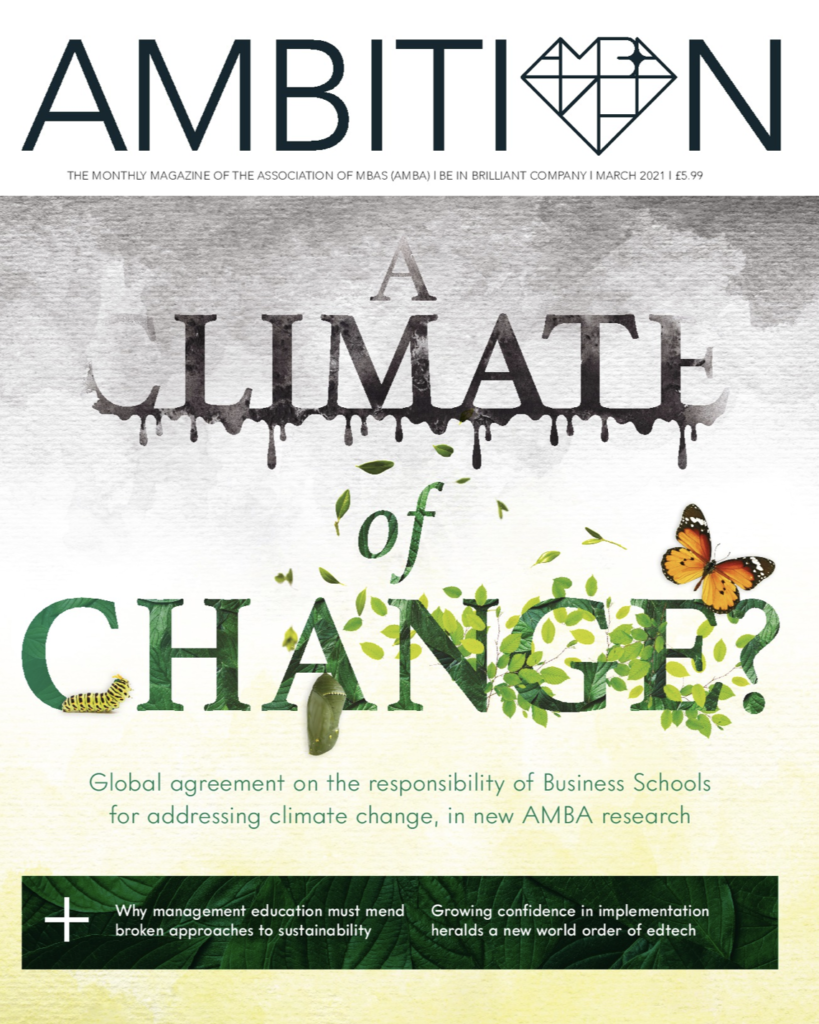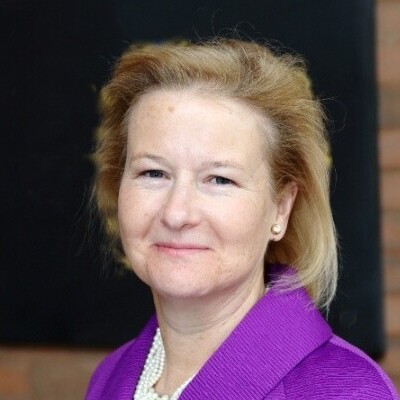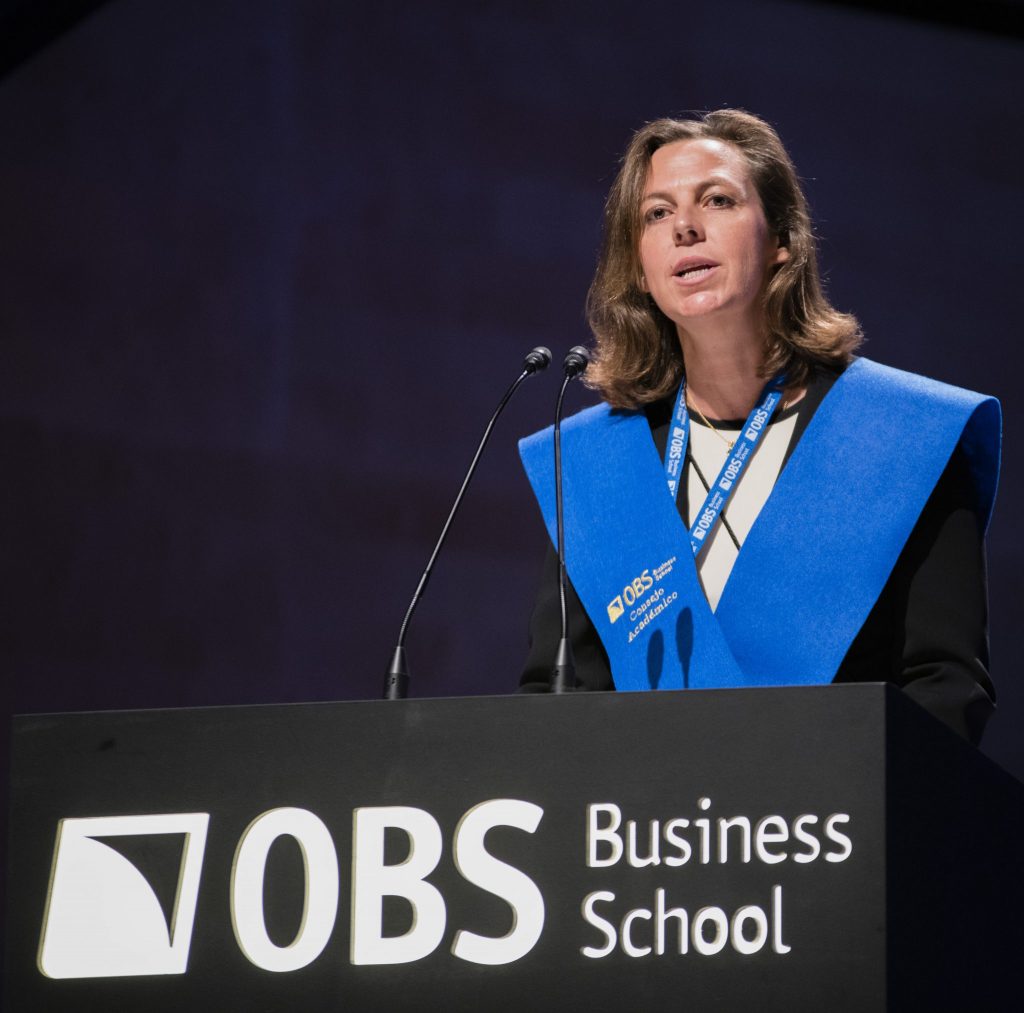Casilda Güell, Dean of Barcelona-based OBS Business School, tells Tim Banerjee Dhoul how specialised online institutions can continue to differentiate themselves from the growing number of Business Schools that are shifting programmes online
‘What will differentiate online institutions from new online education providers is the experience,’ says Casilda Güell, Dean of OBS Business School, in reference to the number of Business Schools shifting operations online and adapting face-to-face programmes to the requirements of a world still shaken by the Covid-19 pandemic.
Based in Barcelona, Spain, OBS Business School (OBS) is a fully online institution established in 2006 in conjunction with media group, Grupo Planeta, and primarily offers Spanish-language programmes. Supported academically by the University of Barcelona, OBS does, however, count English-language options for an executive MBA and international business management master’s among its current portfolio. In the following exclusive interview with Business Impact, Casilda Güell offers her thoughts on how the student learning experience differs at a specialised online institution. She also talks about the evolution of online education as a whole, and her School’s stance with regards to responsible management and CSR.
Why is online management education important in your country? What is the value it brings to the community you serve?
Nowadays, professionals need to recycle their knowledge and acquire new soft and hard skills if they want to evolve. Nevertheless, sometimes professional and personal responsibilities impede the possibility to enrol in face-to-face programmes, which lack flexibility. In this context, online higher education has become the perfect solution.
Moreover, the incorporation of new IT tools and global access to internet – along cities and towns, no matter their sizes – has reduced the barriers to higher education studies. Students who have no option to move from one country to another, because of their personal responsibilities or the implied educational cost, can now enrol in quality management programmes.
Management education has become key to all institutions and companies. In Spain, most of the curricula at bachelor’s level, no matter the area, now include subjects related to management. Therefore, today’s professionals in leading positions need to acquire this knowledge, no matter what their area of work is. Online education specifically focused on management gives them the perfect solution.
How has the demand and the reputation of online education changed over the past five years and how do you expect it to change in the next three years?
During the last years, higher education has changed abruptly because of the incorporation of new IT tools and because of globalisation.
As technology has become part of our society, so too have institutions where the main activity takes place online. This has allowed individuals to change their perceptions about online education. The incorporation of online courses and programmes at renowned academic institutions, such as Harvard or MIT, has also contributed to enhance their reputation, as well as increasing the demand for this format of education.Moreover, new technologies have enhanced the quality of programmes provided online, and the students’ learning experience.
Today, an online platform is not just a resources repository, it is a space where students interact between themselves and with their teachers. They can also participate in debates and synchronous web conferences through the same platform.
In addition, AI offers powerful tools that are key to solving some online education handicaps, such as verification of a student’s identity during exams. In short, online education has qualitatively changed.
In the next three years, I believe that individuals will be more likely to study online and all the stigma that online education still has will have disappeared. Other technologies will be incorporated into platforms, and the quality of the learning experience will continue to increase, year by year.
Do you think that the market for online management education will become more competitive in the next three years, in light of Covid-19? If so, how can established providers of online programmes ensure they stay ahead of new market entrants?
Because of the unexpected situation arisen from Covid-19, face-to-face institutions have been forced to adopt an emergency virtualisation. In the following years, these institutions will transition from face-to-face education to online education, not completely but partially.
In the current academic year, 2020-2021, Harvard University and Cambridge University, for example, are running all activities online. In the case of Spain, institutions are going to adopt a blended model in this academic year. Nevertheless, face-to-face activity will still dominate the market because, beyond the methodology, there is the experience that new students have when attending the university.
The situation does increase the existing competition. Nevertheless, it is good to know that face-to-face institutions that have adopted a virtual model during the pandemic are not applying an online methodology [or pedagogy] but are instead adopting technological tools to develop their activity.
Online methodology is more than using technology for teaching, it is a new definition of all the elements that interact during the learning process. Therefore, while there will be more institutions with online programmes, there may not be more that apply online methodology. Ultimately, what will differentiate online institutions from new online education providers is the experience.
In the case of OBS, we conduct market research twice a year with the aim of identifying new competition and programmes, and try to differentiate from them.
Can you tell me a bit about the type of people who study at your School and what those who have graduated from your School have gone on to do in the local region and beyond?
As an online institution, our students come from across the world. We have students from five different continents. Nevertheless, since most of our programme portfolio is taught in Spanish, the vast majority of our students come from Latin America. In addition, 95% of our students are working and 85% of them hold a managerial position.
Since we provide master’s-level education and one of our strengths is the flexibility provided to those who are working, the mean age of our students is 38 years. However, in the past few months, younger students have been attracted to our programmes as well, mainly because of the [pandemic] situation we are all currently living through.
OBS students enrol in our programmes with the aim of enhancing their professional position and acquiring new knowledge and soft/hard skills. So, once they finish their studies, 70% of the unemployed students find a job, mostly in their existing region, and 65% of all students achieve some form of career progression during the first six months after finishing their studies.
Which single new programme, course, or initiative are you most excited about and why?
This year, we have redefined our student experience strategy. Although the strategy has always been to place students at the centre of the learning process, we are now introducing new elements and activities oriented to enhance their experience during their time at OBS as students and as alumni.
We have redefined our platform, the structure as well as the content, and incorporated new workshops and spaces. For example, we have included a welcome area where students, after their enrolment in a programme, have resources and digital tools to develop several skills that we consider important during their time at OBS, as well as in their professional lives thereafter. Before students take their first subject, there is also a programme in which further skills are developed hand-in-hand with a lecturer. Both spaces gather all OBS students, which gives them the chance to establish new contacts.
Does your portfolio of programmes encompass any on-campus elements?
Since we are 100% online, we do not have any face-to-face activities or in-person elements, in the context of our programmes. Nevertheless, once students complete their master’s degree, we celebrate the graduation event, for which students from all our programmes come to Barcelona in person. At the most recent graduation event, we had more than 1,000 individuals. Over two days, these students participate in an alumni event, in which students attend seminars and leisure activities, as well as the graduation itself, where they receive their diplomas and at which prizes are awarded to the best student, teacher and final master’s project.
Does your School engage with businesses, government and other public-sector organisations in your region? If so, how?
We have an agreement with the town hall of Hospitalet de Llobregat (a city within the province of Barcelona, to its southwest) and we grant students from this city scholarships for our programmes. We are also promoting collaborations with companies and professional associations, through which employees/members receive discounts on programme fees.
How is the School working to boost the employment prospects of its graduates?
We conduct a number of different activities that aim to enhance students’ employability.
For example, programmes include webconferences with professionals and experts. We conduct interviews with professionals, which offer deep dives on general topics. In addition, most of our final master’s thesis projects are developed jointly with businesses. These aim to provide solutions for companies in areas that are related to the programme on which the student is enrolled.
There is also a job offer pool that students can access through our alumni area, in our virtual campus. There, they can find different offers related to their area(s) of expertise.
What does ‘responsible management’ mean to your School and how is this concept introduced to, and instilled into, your students?
For OBS Business School, responsible management is based on providing our students with the necessary knowledge to design and develop business processes while meeting social and environmental standards.
OBS considers that international, ethnic, gender, religious and cultural diversity is a key driver to develop values of CSR and sustainability – such as respect, tolerance, acceptance and integration. Our students come from different cultures and backgrounds, and we believe this enriches the students’ learning experience.
Since 2012, OBS is part of the UN Principles for Responsible Management Education (PRME) and our objective in all aspects of our strategic planning is to accomplish and adhere to the initiative’s Six Principles. In 2019, we added a master’s degree that is 100% focused on CSR and sustainability to our portfolio. However, the aforementioned values are integrated across all programmes as mandatory and elective courses, as well as through the use of case studies of companies that are particularly reputed for their CSR activities and approach as well as for their sustainable performance.
Students are encouraged to encompass the dimensions of sustainability, development and/or CSR in their final projects and the School organises an annual competition, in which an award is given to the project that focuses the most on these dimensions.
What plans does your School have for the next three years?
Our plan is to adopt new technologies as they appear in the market, as well as to continue offering programmes that are in line with the latest trends, introducing new programmes as appropriate. We will also keep improving students’ learning experience, through the introduction of new strategies and tools, and redefine our methodology by adapting it progressively to the existing context.
Casilda Güell is the Dean of OBS Business School (OBS). She holds a PhD from LSE and is a Fellow at its European Institute.
This article is taken from Business Impact’s sixth edition in print.







































